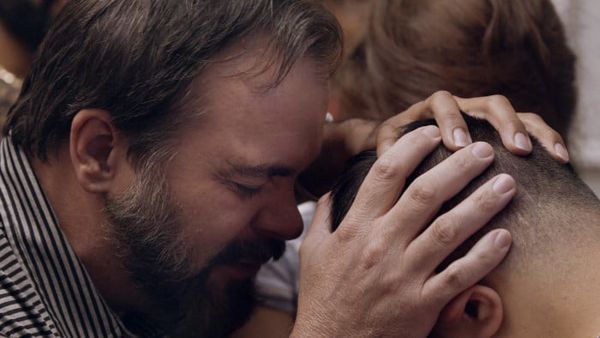Eye For Film >> Movies >> Pray Away (2020) Film Review
Pray Away
Reviewed by: Jennie Kermode

Over the last few years, since it finally came to the attention of the wider public, a good deal has been written about LGBT conversion therapy. Films like Boy Erased and The Miseducation Of Cameron Post have alerted viewers to some of the cruelties involved, though there has yet to be a mainstream film that touches on the systematised brutality of its worst incarnations. This documentary does something different. Instead of focusing primarily on the (mostly) young people who are subjected to it, it tells the story of the conversion therapy movement from the point of view of those who founded it - who were LGBT themselves.
The basic idea is something that anyone might feel sympathy for. All of us have traits, often psychological, that we'd like to change about ourselves, and if we can find therapy to help us 'fix' some of those, why not others? Two things complicate this. Firstly, there's the tremendous pressure that vulnerable people raised in homophobic and transphobic societies feel to conform, which erodes the concept for free consent. Secondly, people have been trying to 'cure' being LGBT for decades - arguably centuries - and there is, to date, absolutely no solid evidence that it works. People may behave differently but their feelings seem to remain the same. Meanwhile, it significantly increases rates of self harm and suicide. The rate of 'relapse' is staggeringly high, and includes many of the movement's founders.

Sympathy is not something that most of these people seem to feel for themselves. They know now what they did, and know that their renunciation of it cannot stop its continued rollout around the world. Here they talk about the good intentions they had when they started out and how, often in a continued effort to do good, they found themselves lying and distorting the truth of their observations and experiences. The film unfolds like a religious parable, illustrating how easy it is to become corrupted when single-mindedly pursuing a goal. It explores the psychological pressures of fame and the distorting effect on perspective that comes from stepping out of obscurity and suddenly finding oneself in front of cheering crowds.
Whilst this consists mostly of interviews - which sometimes feel more like confessionals - we also get to see inside the continuing movement courtesy of a participant who used to identify as a trans woman and who now stops strangers in the street to offer them blessings and tell them that sexual orientation and gender identity can be changed. With very strict ideas of gender roles involved here, the pro-conversion activists don't see much of a distinction between the two - believing, for instance, that femininity is defined in part by an attraction to men, so that any man who has sexual encounters with men is expressing himself in a feminine way. If this sounds as if it requires a rather sheltered view of the world, that certainly fits with what the film presents to us. Its participants are overwhelmingly white, from rural or small town backgrounds, and raised with no exposure to anything that might make them look beyond the view of morality and religion presented to them by their elders. One young man tries to explain how he was raised to think of gay people as "just horrible," but even now he can't articulate the logic involved, as if there never was any real thought involved.
Most of these pro-conversion activists seem like lovely people, invested in the idea that thy are helping others. Distinctly less sympathetic are the megachurch preachers whom we see only in clips of their stage performances, rallying the crowds. Access to these people would have made for a stronger film but is hardly to be expected. For them, there is big money at stake.
For the ex-ex-gays we meet here, more than their own livelihoods and lives have been at risk. One talks about his divorce from an ex-lesbian with whom he had raised children. Another has stayed with her husband, coming to terms with the fact that she's bisexual. These and other stories make clear that the pressure wasn't as simple as a desire for sex. Even mentally acknowledging a same sex attraction was forbidden, and friendships which might lead to temptation were forced to end.
We don't really get into the physically violent side of conversion therapy here - it's entirely possible that some of those who support the wider movement would reject it as abusive - but the film does a good job of putting across the way that less dramatic interventions can do serious psychological damage. It's an interesting study of the way that one person's damage can impact others, with sociological connotations which go beyond this particular practice. It's an attempt at reparation by some of those involved, and a moving collection of personal stories.
Reviewed on: 04 Aug 2021

















